一般过去时的概念
一般过去时与过去完成时的区别

一般过去时与过去完成时的区别一般过去时和过去完成时都是英语中表示过去的时态,但它们在使用和表达上有着不同的区别。
本文将从不同的角度来探讨一般过去时和过去完成时的区别。
一、时间概念1. 一般过去时:一般过去时用来表示过去某个具体的动作或状态。
常常与表示过去的时间状语连用,如:yesterday(昨天)、last week(上周)、in 1999(在1999年)、three days ago(三天前)等。
2. 过去完成时:过去完成时用来表示过去某个动作或状态在另一个过去的时间点之前已经完成。
通常有两个动作或状态,其中一个发生在另一个之前。
常常与表示过去的时间状语连用,如:before(之前)、after(之后)、by the time(到…之时)等。
二、动词形式1. 一般过去时:一般过去时的谓语动词通常是由动词的过去式构成。
例如:play(玩)- played(玩过);go(去)- went(去过);study(学习)- studied(学习过)等。
2. 过去完成时:过去完成时的谓语动词通常是由助动词 had 和动词的过去分词构成。
例如:have(有)- had (曾有);eat(吃)- eaten (吃过);write(写)- written(写过)等。
三、用法1. 一般过去时:一般过去时用来描述过去的动作或状态,强调动作或状态的完成。
例如:I watched a movie last night.(昨晚我看了一部电影。
)He lived in Beijing for ten years.(他在北京住了十年。
)2. 过去完成时:a. 表示过去某个动作在另一个过去的时间点之前已经完成。
例如:I had finished my homework by the time he arrived.(他到达时,我已经完成了作业。
)b. 表示过去某个动作在过去某个时间点之前已经完成,但没有明确指出这个时间点。
例如:She had already left when I arrived.(我到达时她已经离开了。
一般过去时
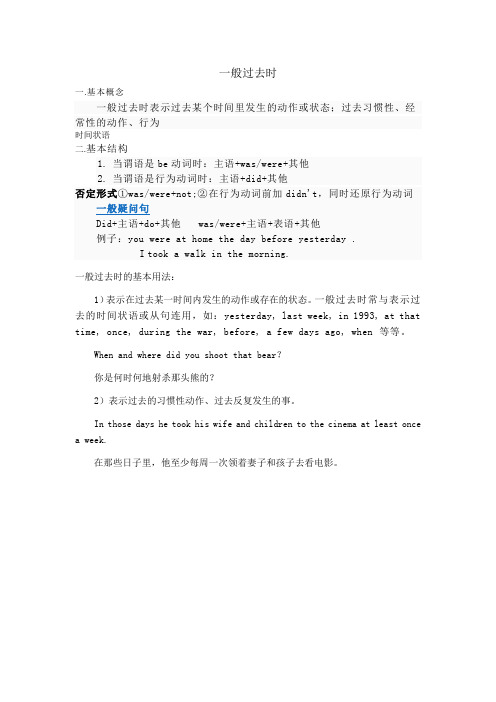
一般过去时一.基本概念一般过去时表示过去某个时间里发生的动作或状态;过去习惯性、经常性的动作、行为时间状语二.基本结构1.当谓语是be动词时:主语+was/were+其他2.当谓语是行为动词时:主语+did+其他否定形式①was/were+not;②在行为动词前加didn't,同时还原行为动词一般疑问句Did+主语+do+其他 was/were+主语+表语+其他例子:you were at home the day before yesterday .I took a walk in the morning.一般过去时的基本用法:1)表示在过去某一时间内发生的动作或存在的状态。
一般过去时常与表示过去的时间状语或从句连用,如:yesterday, last week, in 1993, at that time, once, during the war, before, a few days ago, when 等等。
When and where did you shoot that bear?你是何时何地射杀那头熊的?2)表示过去的习惯性动作、过去反复发生的事。
In those days he took his wife and children to the cinema at least once a week.在那些日子里,他至少每周一次领着妻子和孩子去看电影。
一般过去式的练习题一.动词填空,用所给动词的适当形式填空1. Tom and Mary ___________ (come) to China last month.2. Mary __________ (read) English yesterday morning.3. There _________ (be) no one here a moment ago.4. I ___________ (call) Mike this morning.5. Tom ___________ (begin) to learn Chinese last year.6. Last week we _________ (pick) many apples on the farm.7. My mother ________________ (not do) housework yesterday.8. She watches TV every evening. But she _______________ (not watch) TV last night.9. ________ your father ________ ( go ) to work every day last year?10. —What time _______ you _______ (get) to Beijing yesterday?—We __________ (get) to Beijing at 9:00 in the evening.二. 选择填空1. _____ he ________ a good rest? No, he didn’t.A. Have, hadB. Did, haveC. Did, hadD. Had, had2. Mr. Black was late because he _______ his way.A. lostedB. had lostC. has lostD. lost3. When _________ Lee ________ school this morning?A. had, got toB. did, get toC. did, getD. did, got to4. Will you please say it again? I ________ quite _______ you.A. didn’t, hearB. haven’t, heardC. didn’t, heardD. hadn’t, heard5. ______ you ________ at six o’clock yesterday?A. Do ,get upB. Did, get upC. Do, got upD. Did, got up6.What did you see _________?A. nowB. every dayC. since 1990D. just now7.He went into the room and _______ the door.A. lockB. lockingC. locksD. locked8. —What _____ you _______ last week?—I bought a bag.A. did ,buyB. did , boughtC. do, buyD. do, bought9. —_____ he ____ his lunch?— Yes, he did.A. Have ,hadB. Had, hasC. Did, haveD. Did, had10.—Did the thieves _____ into the car?—No, they______.A. fell, didn’tB. fall, didC. jump, didn’tD. jump, did11. —When did May come back from Hong Kong?—She _____ from Hong Kong last Friday.A. come backB. comes backC. returned backD. came back12. ____ she _____ this dictionary in the bookshop nearby last week?A. Did, buyB. Does, buyC. Did, boughtD. Does, buys13. He ____ to the station this morning and was______ for the train.A. hurry, in timeB. hurries, on timeC. hurried, in timeD. hurried, at time14. —Have you seen him today?—Yes, I ____ him this morning.A. has seenB. seeC. will seeD. saw15. He ______ worried when he heard the news.A. isB. wasC. doesD. did16. There _____ a telephone call for my brother Steven yesterday?A. isB. areC. wasD. were17. Liu Fengwei _____ three yuan for the lost library book.A. paidB. payC. spentD. lost18. He ____ in this school in 1958.A. taughtB. has taughtC. teachesD. had taught19. They _____ tired so they stopped ____ a rest.A. are, haveB. were, haveC. were, to haveD. are, having20. Yesterday I _____ in bed all day because I had a fever.A. layB. lieC. laidD. lain21. Hello, Mike. It’s you. I _____ you ______ in Beijing. How long have you been here?A. don’t know, we reB. hadn’t known, areC. haven’t known, areD. didn’t know, were22. As soon as we saw his face, we ___ the news ___ bad.A. knew, wasB. know, wereC. know, wasD. knows,。
一般过去时

三.一般过去时(simple past tense)1.概念一般过去时表示过去某一时刻,某一段时间发生的动作或存在的状态。
一般过去时用动词的过去式表示。
2.构成一般过去时用动词的过去式表示。
be的过去式有was,were两种; have 的过去式是had;规则动词的过去式在动词词尾加-ed,具体构成规则如下:1)一般情况,动词后加ed,例词work-worked,clean-cleaned,play-played,wash-washed2)以不发音的e结尾,-d,例词live-lived,move-moved,hope-hoped,arrive-arrived 3)以辅音字母+y结尾,变y为 i再加-ed,例词study-studied,carry-carried,cry-cried,identify-identified 4)以辅音字母结尾的重读闭音节,双写最后一个辅音字母加-ed,例词plan-plannedstop-stopped,beg-begged,grab-grabbed 3.用法 (1) 表示发生在过去的动作或存在的状态。
如:He went shopping with his friends last week.They arrived ten minutes ago.He became a hotel manager ten years ago.Did you go to the concert last night?(2) 表示在过去经常发生的动作或习惯动作。
如:He visited his grandparents once a month last year.She usually went to work by car last year.When I was at school, I always went to school by bus.4.如何识别一般过去时常见的标志词有:1). yesterday, the day before yesterday.2). last week / year / month / term …(简称last系列)3). two hours ago, three years ago, a moment ago…(简称ago系列)4). in / on + 过去的年/月/日,如 in 1999, on April, 20055). just now, once upon a time, one day…5.易错点例析:(1)——Your phone number again? I _________ quite catch it.——It’s 4331577A. didn’tB. couldn’tC. don’tD. can’t(2)——Mr. Smith isn’t coming tonight.——But he _________.A. promisesB. promisedC. will promiseD. had promised(3) ——Hey, look where you are going!——Oh, I’m terribly sorry. _________.A. I’m not noticingB. I wasn’t noticingC. I haven’t noticedD. I don’t notice(4) ——Oh it’s you ! I _________ you.——I’ve had my hai r cut.A. didn’t realizeB. haven’t realizedC. didn’t recognizeD. don’t recognized(5) ——Since you’ve agreed to go, why aren’t you getting ready?——But I _________ that you would have me start at once.A. don’t realizeB. didn’t realizeC. hadn’t realizedD. haven’t realized(6) ——It’s twelve o’clock, I think I must be off now.——Oh, really? I _________ it at all.A. don’t realizeB. haven’t realizedC. didn’t realizeD. hadn’t realizedKey:ABBCBC6.中考真题及模拟(2009朝阳区一模)He went into his room, _______ the light and began to work.A. has turned onB. will turn onC. turns onD. turned on(2009海淀一模)——What’s the best food have you had in Beijing, Alex?——Roast duck! I _________to a famous restaurant to have it last week.A. have goneB. goC. will goD. went(2009宣武区一模)——Do you know how many gold medals the 23-year-old Michael Phelps _____________at the 2008 Summer Olympic Games?——Eight.A. winB. winsC. wonD. has won(2008北京)We were in Qingdao last week and __________ great fun there.A. will haveB. have hadC. hadD. have(2007北京)——What did you do after school yesterday?——I _________basketball with my friends.A. playB. playedC. will playD. am playing(2005北京)---Hi, Kate. You look tired. What’s the matter?---I ______well last night.A. didn’t sleepB. don’t sleepC. haven’t sleptD. won’t sleep (2008四川泸州)Yesterday,Tony’s family _________ a good time.A. hasB. haveC. had(2007湖南湘潭)I’m sorry you’ve missed the train. It _______10 minutes ago.A. leftB. has leftC. had left(2007福州)——Mr Green, __________you________ Three Lanes and Alleys(三坊七巷)last Sunday?——No, but I’ll visit them next week.A. will; go toB. have; been toC. did; go toD. have; gone to (2007浙江)——What did the teacher say just now?——He __________us not to play computer games all day.A. tellsB. toldC. has toldD. is told(2007江西)——Inventors have changed the way we live.——So they are famous for the great things they _________.A. doB. didC. are doingD. had done(06江西)——Where’s the cake I made this morning?——We _______ it, mum. Can you make another one for us?A. ateB. eatC. will itD. were eating。
一般过去时的定义以及用法概念
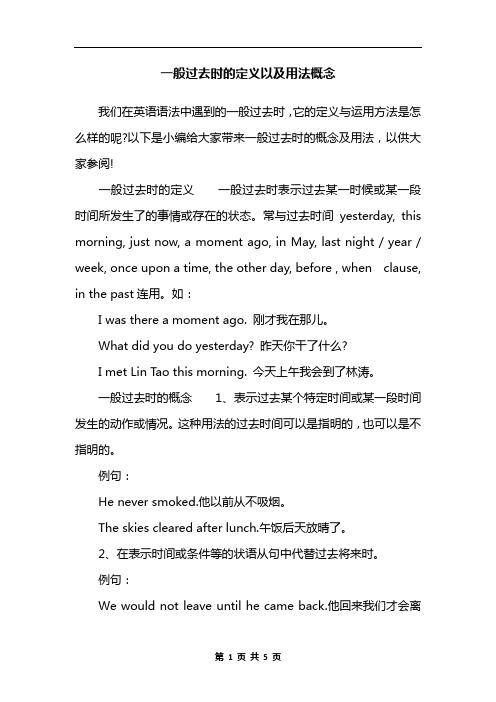
一般过去时的定义以及用法概念我们在英语语法中遇到的一般过去时,它的定义与运用方法是怎么样的呢?以下是小编给大家带来一般过去时的概念及用法,以供大家参阅!一般过去时的定义一般过去时表示过去某一时候或某一段时间所发生了的事情或存在的状态。
常与过去时间yesterday, this morning, just now, a moment ago, in May, last night / year / week, once upon a time, the other day, before , when clause, in the past连用。
如:I was there a moment ago. 刚才我在那儿。
What did you do yesterday? 昨天你干了什么?I met Lin Tao this morning. 今天上午我会到了林涛。
一般过去时的概念1、表示过去某个特定时间或某一段时间发生的动作或情况。
这种用法的过去时间可以是指明的,也可以是不指明的。
例句:He never smoked.他以前从不吸烟。
The skies cleared after lunch.午饭后天放晴了。
2、在表示时间或条件等的状语从句中代替过去将来时。
例句:We would not leave until he came back.他回来我们才会离开。
I didnt go to the party that evening as I started the next day.那天晚上我没有去参加聚会,因为我第二天就要出发。
3、表示现在时间。
这种用法使句子在语气上较为婉转客气,能这样用的动词为数不多,如:hope,wish,want,wonder,think,intend 等。
例句:I hoped you would come and have dinner with us.我希望你能来和我们一起吃饭。
一般过去时的含义
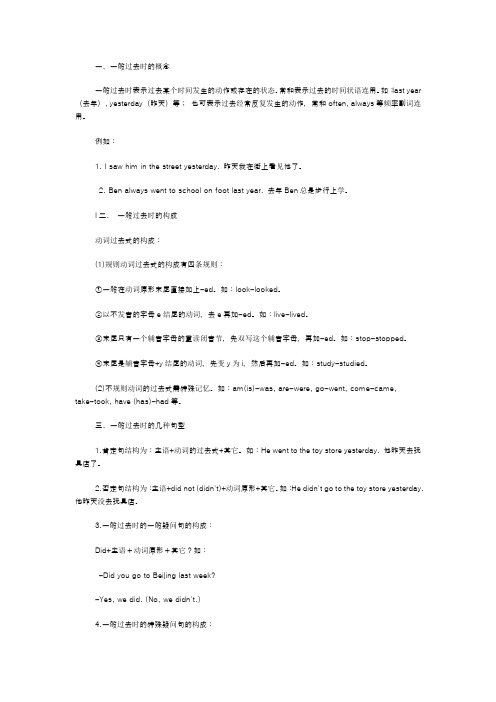
一、一般过去时的概念一般过去时表示过去某个时间发生的动作或存在的状态。
常和表示过去的时间状语连用。
如:last year (去年), yesterday(昨天)等;也可表示过去经常反复发生的动作,常和often, always等频率副词连用。
例如:1. I saw him in the street yesterday. 昨天我在街上看见他了。
2. Ben always went to school on foot last year. 去年Ben总是步行上学。
I二、一般过去时的构成动词过去式的构成:(1)规则动词过去式的构成有四条规则:①一般在动词原形末尾直接加上-ed。
如:look-looked。
②以不发音的字母e结尾的动词,去e再加-ed。
如:live-lived。
③末尾只有一个辅音字母的重读闭音节,先双写这个辅音字母,再加-ed。
如:stop-stopped。
④末尾是辅音字母+y结尾的动词,先变y为i,然后再加-ed。
如:study-studied。
(2)不规则动词的过去式需特殊记忆。
如:am(is)-was, are-were, go-went, come-came,take-took, have (has)-had等。
三、一般过去时的几种句型1.肯定句结构为:主语+动词的过去式+其它。
如:He went to the toy store yesterday. 他昨天去玩具店了。
2.否定句结构为:主语+did not (didn't)+动词原形+其它。
如:He didn't go to the toy store yesterday. 他昨天没去玩具店。
3.一般过去时的一般疑问句的构成:Did+主语+动词原形+其它?如:-Did you go to Beijing last week?-Yes, we did. (No, we didn't.)4.一般过去时的特殊疑问句的构成:疑问词+did+主语+动词原形+其它?如:1) -What did you do last night(昨晚)?-I did my homework.2) -Where did you go last week?-I went to Shanghai with my parents.一般过去时口诀一般过去时并不难,表示过去动作、状态记心间。
一般过去时的使用范围

一般过去时的使用范围摘要:一、一般过去时的定义与应用场景二、一般过去时的使用范围1.动作或状态发生在过去某个具体时间2.描述过去习惯性动作或状态3.转述他人过去的经历或陈述事实4.表达过去某个时间点的客观事实正文:一般过去时(Simple Past Tense)是英语中的一种时态,表示过去某个时间发生的动作或存在的状态。
它在日常交流、书面表达等各种场景中都有广泛的应用。
下面我们来详细了解一下一般过去时的使用范围。
1.动作或状态发生在过去某个具体时间一般过去时可以用来描述过去某个具体时间点发生的动作或状态。
例如:- I watched a movie yesterday.(我昨天看了一部电影。
)- She visited her grandparents last week.(她上周拜访了她的祖父母。
)2.描述过去习惯性动作或状态一般过去时还可以表示过去某个时间段内经常发生的动作或存在的状态。
例如:- He usually went to the gym after work.(他下班后通常去健身房。
)- She was a good student in high school.(她高中时是个优秀的学生。
)3.转述他人过去的经历或陈述事实在转述他人过去的经历或陈述事实时,我们也可以使用一般过去时。
例如:- He said he had visited many countries.(他说他去过很多国家。
)- She explained that she had studied English for five years.(她解释说她学英语已经五年了。
)4.表达过去某个时间点的客观事实一般过去时还可以用来表达过去某个时间点的客观事实。
例如:- The sun rose in the east.(太阳从东方升起。
)- The plane landed safely at the airport.(飞机安全降落在机场。
一般过去式的定义
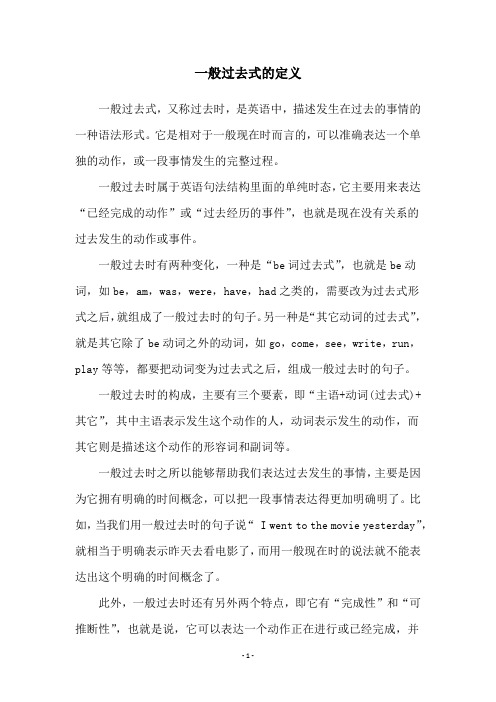
一般过去式的定义一般过去式,又称过去时,是英语中,描述发生在过去的事情的一种语法形式。
它是相对于一般现在时而言的,可以准确表达一个单独的动作,或一段事情发生的完整过程。
一般过去时属于英语句法结构里面的单纯时态,它主要用来表达“已经完成的动作”或“过去经历的事件”,也就是现在没有关系的过去发生的动作或事件。
一般过去时有两种变化,一种是“be词过去式”,也就是be动词,如be,am,was,were,have,had之类的,需要改为过去式形式之后,就组成了一般过去时的句子。
另一种是“其它动词的过去式”,就是其它除了be动词之外的动词,如go,come,see,write,run,play等等,都要把动词变为过去式之后,组成一般过去时的句子。
一般过去时的构成,主要有三个要素,即“主语+动词(过去式)+其它”,其中主语表示发生这个动作的人,动词表示发生的动作,而其它则是描述这个动作的形容词和副词等。
一般过去时之所以能够帮助我们表达过去发生的事情,主要是因为它拥有明确的时间概念,可以把一段事情表达得更加明确明了。
比如,当我们用一般过去时的句子说“ I went to the movie yesterday”,就相当于明确表示昨天去看电影了,而用一般现在时的说法就不能表达出这个明确的时间概念了。
此外,一般过去时还有另外两个特点,即它有“完成性”和“可推断性”,也就是说,它可以表达一个动作正在进行或已经完成,并且可以推断出某种结果。
比如,用一般过去时的句子说“I ate an ice-cream”,就可以推断出我已经吃了冰淇淋,并且吃完了。
因此,可以说一般过去时是英语句法结构中最常用的时态之一,它的主要用途就是表达在过去发生的一个或一段事情,而它的特点,就是具有明确的时间概念,具有完成性和可推断性。
只要把动词变为过去式,就可以正确地表达这样的场景了。
一般过去时详解
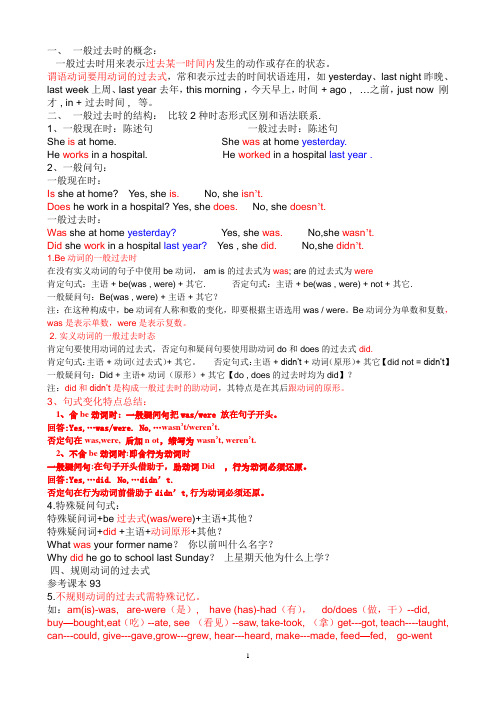
一、一般过去时的概念:一般过去时用来表示过去某一时间内发生的动作或存在的状态。
谓语动词要用动词的过去式,常和表示过去的时间状语连用,如yesterday、last night昨晚、last week上周、last year去年,this morning ,今天早上,时间 + ago , …之前,just now 刚才 , in + 过去时间 , 等。
二、一般过去时的结构:比较2种时态形式区别和语法联系.1、一般现在时:陈述句一般过去时:陈述句She is at home. She was at home yesterday.He works in a hospital. He worked in a hospital last year .2、一般问句:一般现在时:Is she at home? Yes, she is.No, she isn’t.Does he work in a hospital? Yes, she does. No, she doesn’t.一般过去时:Was she at home yesterday? Yes, she was. No,she wasn’t.Did she work in a hospital last year? Yes , she did. No,she didn’t.1.Be动词的一般过去时在没有实义动词的句子中使用be动词, am is 的过去式为was; are的过去式为were肯定句式:主语 + be(was , were) + 其它. 否定句式:主语 + be(was , were) + not + 其它.一般疑问句:Be(was , were) + 主语 + 其它?注:在这种构成中,be动词有人称和数的变化,即要根据主语选用was / were。
Be动词分为单数和复数,was是表示单数,were是表示复数。
2. 实义动词的一般过去时态肯定句要使用动词的过去式,否定句和疑问句要使用助动词do和 does 的过去式 did.肯定句式:主语 + 动词(过去式)+ 其它。
- 1、下载文档前请自行甄别文档内容的完整性,平台不提供额外的编辑、内容补充、找答案等附加服务。
- 2、"仅部分预览"的文档,不可在线预览部分如存在完整性等问题,可反馈申请退款(可完整预览的文档不适用该条件!)。
- 3、如文档侵犯您的权益,请联系客服反馈,我们会尽快为您处理(人工客服工作时间:9:00-18:30)。
一般过去时的概念
1.一般过去时表示过去某个时间发生的动作或存在的状态,常和表示过去的时间状语连用。
一般过去时也表示过去经常或反复发生的动作感谢。
2.Be动词在一般过去时中的变化:
⑴am 和is在一般过去时中变为was。
(was not=wasn’t)
⑵are在一般过去时中变为were。
(were not=weren’t)
⑶带有was或were的句子,其否定、疑问的变化和is, am, are一样,即否定句在was或were后加not,一般疑问句把was或were调到句首。
3.句中没有be动词的一般过去时的句子
否定句:didn’t +动词原形,如:Jim didn’t go home yesterday.
一般疑问句:在句首加did,句子中的动词过去式变回原形。
如:Did Jim go home yesterday? 特殊疑问句:⑴疑问词+did+主语+动词原形?如:What did Jim do yesterday?
⑵疑问词当主语时:疑问词+动词过去式?如:Who went to home yesterday?
动词过去式变化规则:
1.一般在动词末尾加-ed,如:pull-pulled, cook-cooked
2.结尾是e加d,如:taste-tasted
3.末尾只有一个元音字母和一个辅音字母的重读闭音节,应双写末尾的辅音字母,再加-ed,如:stop-stopped
4.以“辅音字母+y”结尾的,变y为i,再加-ed,如:study-studied 5.不规则动词过去式:am,is-was, are-were, do-did, see-saw, say-said, give-gave, get-got, go-went, come-came, have-had, eat-ate, take-took, run-ran, sing-sang, put-put, make-made, read-read, write-wrote, draw-drew, drink-drank, fly-flew, ride-rode, speak-spoke, sweep-swept, swim-swam, sit-sat。
